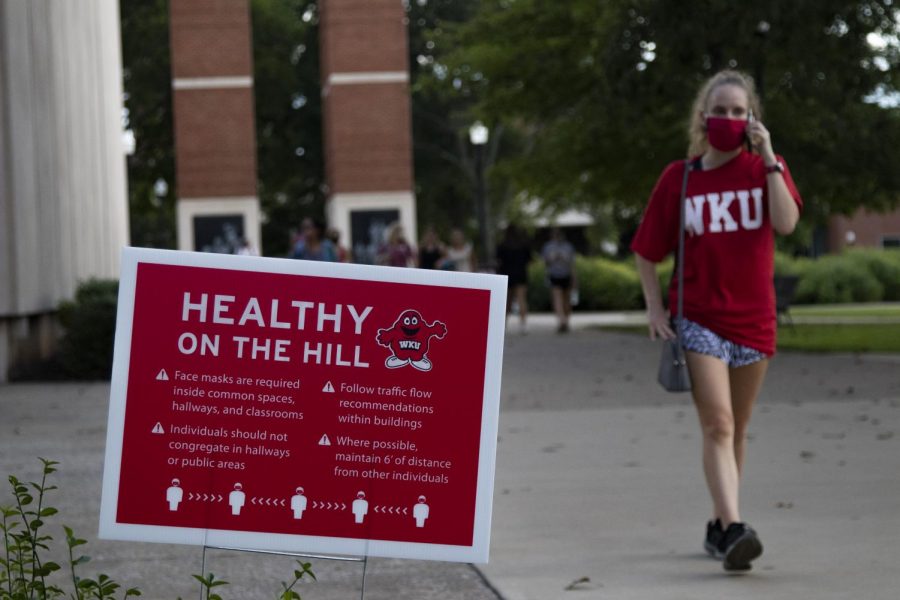As vaccination rates remain low, Warren County enters “red zone”
Signs placed around campus remind students how to be safe and stay healthy while on campus by wearing masks and social distancing from other students.
July 28, 2021
Editor’s Note: This story has been updated with new information.
With the start of the fall semester three weeks away, Warren County moved into the coronavirus “red zone” Tuesday, as the delta variant spreads throughout Kentucky.
According to the Kentucky Cabinet for Health and Family Services, Warren County has a current case rate of 25.9 per 100,000 people, putting it in the critical zone, which starts at 25 cases per 100,000. The county’s positivity rate has climbed to 9.61%, meaning nearly one in 10 people getting a test for COVID-19 are turning up positive for the virus.
The statewide incidence rate is 19.69 per 100,000, and the positivity rate is 8.11% statewide.
The Center for Disease Control and Prevention on Tuesday reversed course and recommended that everyone wear masks in school settings, regardless of vaccination status, to fight the spread of the highly contagious COVID-19 variant.
Governor Andy Beshear announced in a press briefing that all state employees and visitors must wear a mask while inside state buildings.
The recommendations for counties in the “red zone” includes increasing vaccination efforts, encouraging the use of masks in public, encouraging social distancing, and considering postponing large gatherings.
“A decision will be made in the coming weeks for fall semester guidance,” David Oliver, director of environmental health and safety. “Currently those that are not fully vaccinated are expected to wear masks when inside campus buildings.”
According to Kentucky’s COVID-19 vaccination dashboard, 39.45% of the Warren County population has been vaccinated, meaning more than 60% have not.
“The delta variant is much more contagious than other variants circulating in the U.S,” said Susan Eagle, a WKU public health instructor. “It spreads about two to three times faster than its predecessors. It can spread within communities with low vaccination rates much more quickly than previous variants.”
The university does not require vaccinations for students or employees, but it is encouraged.
Earlier this month Rob Hale, associate provost for faculty and academic excellence, shared a syllabus statement with the faculty about COVID-19.
“All students are strongly encouraged to get the COVID-19 vaccine,” according to the statement Hale circulated. “Students who are fully vaccinated will not be required to wear masks or to quarantine if exposed to the virus.” The statement also says: “This guidance is subject to change based on requirements set forth by public health agencies or the office of the governor.”
WKU’s COVID Task Force has created a proposal for updated protocols that will be finalized and shared at the end of July, Hale said.
Eagle noted that the emergence of the delta variant, which started in India, could change the recommendations of public health officials and how institutions like WKU approach the upcoming semester.
“Since the pandemic situation is changing quickly, I would not be surprised to see changes in guidance over the next few weeks,” Eagle said.
As many are hoping for a return to normal, COVID-19 variants could impact what the fall semester will look like.
“Many of us are tired of the pandemic and really want a return to ‘normal,’ but we’re not there yet,” Eagle said. “We all need to stick together and do the right things to protect ourselves, our loved ones, and our communities.”
Digital News Editor Debra Murray can be reached at debra.murray940@topper.wku.edu. Follow her on Twitter @debramurrayy















